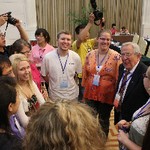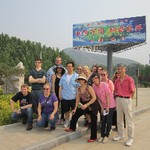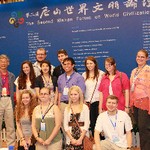Dialogue of Civilizations
Dialogue of Civilizations
By Joseph Swartz and Sarah Wildt
During the Summer School in China study abroad program, students participated in the Dialogue of Civilizations conference at the birthplace of Confucius, called Nishan Forum. Two GVSU students presented their papers at the Forum: Joseph Swartz (history major), on "Past Consequences: Fukuzawa and Meiji Japan," and Sarah Wildt (liberal studies major), on "Dialogue can make a difference - A case study of the women along the Mexican-US Border."
The following articles are Joseph Swartz and Sarah Wildt’s accounts of their experience.
Joseph Swartz:
My first impressions as our study abroad group seated for the opening ceremonies, surrounded by TV crews and waves of globally renowned scholars, was one of dumbstruck-awe. “I am to present here?”
Suddenly, the paper I spent the last few months preparing seemed tiny and insignificant. Fortunately for my ego, the panel I sat in was of a much smaller scale, comprised mostly of Chinese doctoral students.
The presenters sat on the outside of a rectangular array of tables, with an open end facing cameras and an audience of fellow students. Sitting there waiting for my turn, I had the sense that most of the other presenters were just as nervous as myself.
The goal of the Nishan Forums was to find harmony through dialogue between global civilizations. For my topic, I chose to analyze the impact of colonialism on Japan in the late 19th century and the effect of this clash between East and West. I used Fukuzawa Yukichi as a central figure to represent this impact.
Fukuzawa Yukichi had been a former Samurai turned Capitalist; he created one of the largest publication companies of Japan at the time. In 1854, the United States had just forced Japan to open its doors to international commerce and in 1868 they experienced a revolution, replacing the Feudal Shogun.
Fukuzawa’s company was considered the for-most publisher and translator of Western literature and philosophy. Japan learned about the West mostly through Fukuzawa’s interpretation.
The entire experience was beyond words. The Chinese doctoral students seemed energized to learn even though the panel lasted a few hours. Afterwards we were even invited to assist a group edit of the English portion of a speech to be presented in both Chinese and English during the closing ceremonies summarizing of the goals of the forum.
For me, that was the most personal experience. Instead of sitting in a formal environment, we were able refine something as a group. I was able to meet and talk with most of the people I had presented with. During my trip to the Nishan Forum, I gained a taste for just how vast the world of scholarship is. If anything, I am even more excited to continue my studies.
Sarah Wildt:
Participating in study abroad truly changed my life, and is something that I will never forget. Because of my time overseas, I had opportunities that I never would have had if I had not spent time in two foreign countries.
While in Costa Rica, I was able to white water raft, canyon through waterfalls, zip line through cloud forests, and even try out surfing! During my summer in China, I climbed Tai Shan and Hua Shan Mountains, saw the Terra Cotta Warriors, road a yak, and, of course, hiked along the Great Wall!
Though I had a lot of fun overseas, I also experienced a few of the most spiritually challenging and spiritually enriching moments of my life. I learned more about myself in those short months of living in other countries than I could have ever learned staying at Grand Valley.
Living with a host family in Costa Rica and using my Spanish skills daily helped me fully understand daily life for “Ticos” (their nickname). It helped me to understand another culture, but also made me realize how difficult it is for people to get around in a foreign country. It gave me a much greater appreciation for non-English speakers here in the U.S., which is especially important to me because I am currently working with Spanish-speaking people in Texas.
During my time in China, I attended the Dialogue of Civilizations Conference in Nishan. It was one of the greatest honors that I have had; my connections with Professor Peimin Ni made it possible. We were in the presence of some of the world’s most prestigious scholars on this topic, and we were the only group of non-doctoral students in attendance. The honor of giving a presentation on a topic of great importance to me — the violence and danger that Mexican women face along the Mexican-U.S. border — at a very prestigious, world-renowned conference is something that I will always cherish.
Because of this opportunity, I was able to gain a better understanding of scholarly research and presentations, and be able to use the knowledge and techniques I gained through this process throughout my life. My study abroad experience changed my life forever, and I will be eternally grateful to those who supported me, experienced it with me, and helped me to make it happen, like the Padnos International Center.

[1414592801].jpg)



